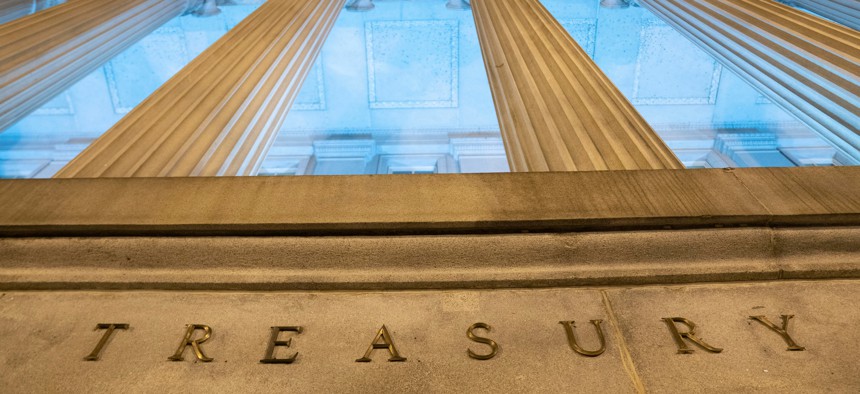States Seek Waiver for $380M in Unemployment Loan Interest

Photo by Liu Jie/Xinhua via Getty Images
The push for a break from the federal government on the borrowing costs comes as Republicans in Congress are increasingly scrutinizing aid for states.
With 10 states and the Virgin Islands on the hook for about $380 million in interest payments on loans from the federal government to keep their unemployment systems funded, and the amount growing every week, state officials are trying to rally support for a bill in Congress that would wipe away the borrowing costs.
But the push comes as Senate Republicans argue that Democrats went overboard passing the $1.9 trillion American Rescue Plan Act, and want to claw back money from states instead of giving them more. And the states with so-called "Title XII advance" loan balances outstanding are largely Democratic leaning, which calls deeper into question whether a proposal to cancel the interest could ever gain serious traction in the narrowly divided Senate.
An emergency request by the Biden administration for more pandemic funding is stalled after Senate Republicans wanted about half of the $15 billion requested to come from taking back $7 billion in ARPA dollars from states.
Still, Illinois Comptroller Susana Mendoza, a Democrat who met with the state’s congressional delegation in Washington this week, told Route Fifty on Thursday that despite having a $1.7 billion surplus, the state could use the money on other things besides paying tens of millions in interest.
“I have to take general revenue funds, which are precious right now, and put those towards interest payments, which I’d hate to do,'' Mendoza said. “But in the meantime, while we figure this out, can you not charge us millions of dollars in interest?”
States, struggling to pay for a surge in unemployment claims, particularly at the start of the pandemic, took out the Title XII advances from the federal government. While some states have paid the money back, 10 others and the Virgin Islands still owe about $40 billion. Illinois is on the hook for $4.5 billion.
Meanwhile, 1.6% interest on the advances is piling up. As of March 15, according to Treasury Department figures, the amount of interest Illinois owes had grown to $40 million. And it’s going up by about $2 million a week, Mendoza said.
According to the Treasury figures, New York, Colorado, Pennsylvania, Connecticut, New Jersey, Massachusetts, Minnesota, California and Texas owe between $4.6 million to $177 million in interest. The Virgin Islands owes $871,000.
The coronavirus relief laws Congress approved during the past two years temporarily waived interest payments and accruals on the advances. But the interest holiday expired Sept. 6, leading to the charges accumulating.
“The Sept. 6 date was just really like an arbitrary date,” Mendoza said. “When they passed that, they probably assumed and hoped that the pandemic would be over and states would maybe be flush with cash and be able to pay this down. But we were still in a massive omicron spike.”
Hopes Riding on New Bill
Mendoza and others are pinning their hopes on a bill introduced two weeks ago by Illinois’ two Democratic senators, Majority Whip Dick Durbin and Tammy Duckworth. The proposal would retroactively wipe out the interest states owe and waive any more from accumulating until Sept. 30.
“Balancing the state’s checkbook is no easy task, especially during a pandemic that deeply impacted our health care systems and economy,” Durbin said in a press release after meeting with Mendoza on Thursday.
Democratic senators Michael Bennet of Colorado, Richard Blumenthal of Connecticut, Kirsten Gillibrand of New York and Tina Smith of Minnesota have signed on to the bill as cosponsors. Illinois Representatives Danny Davis and Brad Schneider introduced the bill in the House.
However, Illinois, along with other states seeking a break, have been running budget surpluses of billions of dollars.
For Illinois, the extra money, though, could go toward filling the state’s $1.8 billion pension liability and for state employees’ medical care. “So there are some very legitimate uses of that surplus,” Mendoza said.
As for Republican attempts to take back federal funds, Mendoza said it would only be fair for congressional Republicans to help out states like Illinois that she said pay more into federal coffers than they receive.
“Here's why I don't feel guilty about it,” she said of the interest waiver. “Illinois over the last five years prior to the pandemic sent $21 billion more to the federal government than we got to keep. And that money went to get back to Arkansas, to Alabama, to all the red states.”
The seven states that joined Illinois in asking Treasury Secretary Janet Yellen to pause the interest accruals “send billions to help these red states essentially pretend that they're fiscally solvent, when in fact they would be bankrupt if it wasn't for us donor states,” she said.
“I would love to claw back the billions of dollars that Illinois sends year after year to states like his,” Mendoza said, referring to Kentucky, which is represented by Republican Senate Minority Leader Mitch McConnell.
McConnell's office did not respond to a request for comment.
Kery Murakami is a senior reporter for Route Fifty based in Washington, D.C.
NEXT STORY: Contentious Fringe Legal Theory Could Reshape State Election Laws






